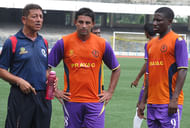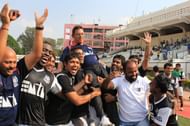When I first met Sanjoy Sen two years back at the Ambedkar Stadium after a Durand Cup match, I was quite impressed with his simplicity and down-to-earth demeanour. At that time, he was guiding the Prayag United ship, and he was immediately noticed for his sensible coaching.
Sen was under the shadow of the then technical director Subrata Bhattacharya, but he never complained, being an affable person with quite a pleasing personality.
Having helped Mohammedan Sporting gain an I-League berth last week, Sen can easily be hailed as one of the most intelligent coaches in the country, one who talks less but has supreme command over his own abilities. Under him, Sporting lost just one match out of 17. Though there have been murmurs around the corner about an alleged ‘fixed match’ against Rangdajied United, however, it won’t put a blotch on Sen’s contributions.
Besides his achievement, Sen would stand out as one of those coaches who has been sincere, less talkative and focused. He never believed in a star team and had major success with Prayag, whom he joined in 2010-11. His less-glamorous team would often beat Mohun Bagan and East Bengal, and did commendably well in the I-League last season.
At a time when Indian football is replete with foreign coaches, Sen’s emergence comes as a huge relief. He isn’t a larger-than-life personality like many others, including his one-time technical director at Prayag. Subrata was preferred to Sen by the club because of former’s fame as a former star player at Mohun Bagan.
Even the media didn’t write much about him after his Prayag success, because his CV didn’t have a mention of either Bagan or East Bengal.
As players, Arsene Wenger or Jose Mourinho never played at big clubs. But our own Indian club officials have a weird idea of associating the ‘big club’ theory whenever they recruit a prospective coach. They inadvertently get attracted easily to a CV which has a mention of top clubs. In his playing career, the 52-year old Sen played for the Railways Football Club in the Calcutta League, and despite not having a big-club background, has been able to cement his place as a successful coach.
At the Ambedkar Stadium dugout, when Subrata used to scream at his players during the match, the low-profile Sen quietly watched. Ask any players from his former team, and they would always hail him as someone who did the ‘real job’ of making Prayag one of the top teams in the I-League.
Last year in November, Prayag decided to part ways with him after the early exit from the Federation Cup and the alleged inability to manage the star names in the dressing room.
Well, it sounds a trifle absurd to axe a coach on such flimsy grounds. Sen proved his merit in less than six months after Sporting’s successful campaign in the I-League second division.
Sen’s case reminds me of Tapan Jyoti Mitra, who once successfully coached Mohammedan Sporting in early 90s. He evolved as a promising coach in the Maidan, but later disappeared from the scene. Last heard, Mitra is working as a coach for the juniors at Avenue Sammilani Club, which is located at Rabindra Sarobar on the southern fringes of Kolkata.
I don’t understand why our own Indian coaches don’t get recognition. Sen has had success with Prayag and his season with Sporting makes him a good enough to handle bigger teams. But off late, since there has been a growing tendency to hire foreign coaches for our clubs, Sen and others will have to wait.

